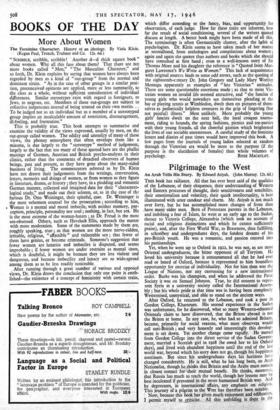BOOKS OF THE DAY
More About Women
The Feminine Character. History 01 an ideology. By Viola Klein. (Kegan Paul, Trench, Trubner and Co. 12s. 6d.)
" SCRIBBLE, scribble, scribble! Another d—d thick square book " about women. Why all this fuss about them? That there are not more books called " Men," " The Masculine Character," and so forth, Dr. Klein explains by saying that women have always been regarded by men as a kind of " out-group " from the normal and dominant strain. " As in the case of other groups in a similar posi- tion, preconceived opinions are applied, more or less summarily, to the class as a whole, without sufficient consideration of individual differences. Similar stereotypes -exist with regard to foreigners, to Jews, to negroes, etc. Members of these out-groups are subject to collective judgements instead of being treated on their own merits. .. To be judged not as an individual but as a member of a stereotyped group implies an incalculable amount of restriction, discouragement, ill-feeling, and frustration."
This is probably true. This book attempts to summarise and examine the validity of the views expressed, usually by men, on the out-group called women. The oddity and unreality of many of these views, the phoney atmosphere that often envelops them like a miasma, is due largely to the " stereotype " method of judgement, largely to the fact that too many of those quoted here are the phallic musings of German, Austrian and British psycho-analysts in their clinics, rather than the comments of detached observers of human beings, past and present, as they have gone about the many-sided business of living. The commentators referred to by Dr. Klein have not drawn their judgements from the writings, conversation, letters, memoirs and doings of women, or from women as they figure in literature, drama, or history ; they have, in a plodding and romantic German manner, collected and imagined data for their " charactero- logical study," and made out their solemn, or, as in the case of the ' furious Dr. Otto Weininger, their spiteful, case. Dr. Weininger is the most vehement counsel for the prosecution ; according to him, . Woman is a mental and moral imbecile, with neither memory, per- ception, principle, personality nor soul ; nothing, in fact, but sex. He is the most extreme of the woman-haters ; as Dr. Freud is the most sex-obsessed. Others, such as Havelock Ellis, approach the matter with more moderation. Some of the statements made by them are, roughly speaking, true • as that women are the more nerve-ridden, irritable, religious, " aftectible " and vulnerable sex ; that fewer of them have genius, or become criminals. Someone's suggestion that fewer women are lunatics and imbeciles is disputed, and seems improbable ; if fewer women are under restraint as mental cases, which is doubtful, it might be because they are less violent and dangerous, and because imbecility and lunacy are so wide-spread among them as to be less readily noticeable.
After running through a great number of various and opposed views, Dr. Klein draws the conclusion that only one point is estab- lished—the existence of a concept of femininity with certain traits,
which differ according to the fancy, bias, and opportunity for observation, of each judge. How far these traits are inherent, how far the result of social conditioning, several of the writers quoted discuss at length. A better book might have been made of all this. The terminology is often Germanically clumsy, after the habit of psychologists. Dr. Klein seems,to have taken much of her matter at secondhand, from anthologies and compilations about women ; again and again she quotes thus authors and books which she should have consulted at first hand ; even to a well-known story of Sir Thomas More and his daughter the reference is " Quoted from Mar- garet Lawrence's We Write as Women." This lack of acquaintance with original sources leads to sonic odd errors, such as the quoting of the eighteenth-century Dr. John Gregory and Lady Mary Wortley Montagu apparently as examples of " late Victorian " attitudes. There are some questionable assertions made ; as that to most Vic- torian women an invalid life seemed attractive, and " the fancies of young girls who would nowadays see themselves pleading at the bar or playing tennis at Wimbledon, dwelt then on pictures of them- selves as pathetically helpless creatures in the grip of lingering (but not painful) illness." Most unlikely. More probably the young girls' fancies dwelt on the next ball, the local croquet tourna- ment, riding to hounds, the spring fashions, picnics and tea-parties with their young friends, all the cheerful gaieties which brightened the lives of our sociable ancestresses. A careful study of the feminine letters and diaries of past times would have improved this book. A few pages from the journals of young ladies selected at random through the Victorian era would be more to the purpose (if the purpose is the elucidation of females) than whole volumes of






























 Previous page
Previous page